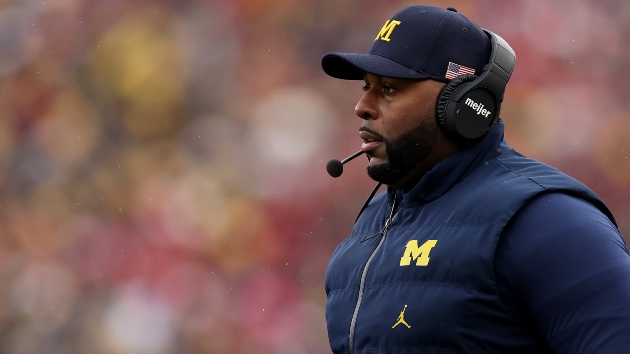CFP Selection Committee’s new chair: Why Michigan AD Warde Manuel is adding another headache to his plate
Written by CBS SPORTS ALL RIGHTS RESERVED on November 4, 2024




The question at this point in College Football Playoff history begs to be asked: Just what the heck is Warde Manuel doing as the new chairman of the CFP Selection Committee? Not that Michigan’s athletic director isn’t qualified, it’s just that the 56-year-old former defensive tackle under Bo Schembechler seems to have a few things on his plate.
“NCAA issues,” Manuel told CBS Sports, filling in the blanks on his own. “Firing a legend in Juwan [Howard]. There have been a lot of issues.”
Yes, and frankly, at this point in his career, Manuel doesn’t need the aggravation. Over the past few years, if he wasn’t crossing light sabers with Jim Harbaugh, he was dealing with Harbaugh’s chatty lawyer, Tom Mars. Connor Stalions might as well have spray-painted graffiti over Michigan’s pristine image in an ongoing NCAA case.
Big Ten expansion has been a long process since the summer of 2022. Basketball coach/Fab Five legacy Juwan Howard was painfully fired last March.
All the while, Manuel oversaw the school’s first football national championship since 1997 and the transition from Harbaugh to Sherrone Moore. There’s that, too.
So, why add more helpings to that plate, Warde?
“I wanted to do it because I wanted to help college football,” Manuel told CBS Sports. “It was a way to give back to a game that I love and [that has] done a lot for me over my lifetime.”
Imagine that — a pure and true pursuit these days. For the next six weeks, Manuel is going to be the face of the CFP, the person trotted up there after the release of the weekly rankings to answer largely inane questions from us unwashed media types.
It’s Manuel’s third year overall on the committee, but he willingly moved up to the chair, knowing it means added duties, commitments, and visibility.
And everyone on the 13-person committee who will rank and seed teams for the first 12-team playoff beginning next month absolutely wants to be there as well.
It’s that much of an honor for the 53 people who have served on the committee since it was instituted in 2014.
It’s kind of like being on the board of a big corporation — except this one may have to endure Lane Kiffin’s social media rants. On a more serious note, current CFP executive director Rich Clark recently told CBS Sports that enhanced security measures will be used to protect committee members.
Last year, the committee was assigned security following threats after Florida State was left out of the field.
“You know what, I’d do it,” Penn State AD Pat Kraft said of serving on the committee. “I’d love to do it. I love the game so much. Just to be in it, to be part of that.”
Manuel will be in Grapevine, Texas, more and longer than the rest of the committee, jetting into Dallas for the weekly rankings process on Sunday afternoon or evening, then departing on the first available flight back to Michigan at 5:45 Wednesday morning. You’ve probably figured out that Manuel will spend parts of four days each week on the process.
It’s his duty to keep those meetings on track along with Clark. The selection committee was formed to look a lot like the NCAA Men’s Basketball Committee under the influence of former CFP executive director Bill Hancock. Hancock also ran the NCAA Final Four for 13 years. He retired this summer after spending 20 years running the BCS and CFP.
Hancock was replaced by Clark, who is a first-timer to the process. (Clark conducted a media webinar about the CFP last week.)
It will be Manuel’s duty to work side-by-side with Clark. Manuel will also be the last committee person out of Dallas each week, staying for the Tuesday release of the rankings, which then includes a Q&A on ESPN and a conference call with reporters.
In a laborious process, those 13 committee members rank 25 teams weekly for the public’s perusal. Never mind that it’s no secret the selection process largely doesn’t matter until it absolutely does on Selection Sunday, Dec. 9.
Everything else is programming and a media mating dance to get the chair to say something he shouldn’t.
“As you know, different media people that are ‘gotcha’ people,” one former committee member told CBS Sports. “They think about it in a way they’re going to try to trap you. At the end of the day, you’ve got to do the best job you can.”
That person compared prying information out of the chairman to Star Trek’s Kobayashi Maru. Google it, kids; the term has come to mean a no-win situation.
“I’ve talked to three of the past four chairs,” Manuel said. “None of them have ever said, ‘They put me in a “gotcha” moment or they wanted to do that.’ At times there are tough questions; you just have to be open and answer them.
“Even being in the [meeting] room the last two years, I never felt that Rece [Davis of ESPN] or anyone was trying to get the chair or anyone in a ‘gotcha’ moment.”
But even in the last few months, it’s fair to say there is a different perception of the game in general. The SEC and Big Ten run the sport. Manuel was asked about the optics of a Big Ten AD heading up the playoff in an era when the Big Ten and SEC are practically partners in CFP dealings. Whether the conferences advocate together for automatic qualifying berths beginning in 2026 won’t be known until after this season.
Meanwhile, if past averages hold, the two super conferences will combine to account for approximately eight of the 12 berths annually.
“My integrity and character mean a lot,” Manuel stressed. “I hope people would understand I’m representing college football. I’m representing a group of 13 … From my perspective people can speculate that way. Those who know me and those who have been in the room know that’s the furthest from the truth.”
No one should question the man’s integrity. In his 20th year as an AD, Manuel was awarded this summer with the National Football Foundation’s Toner Award, which recognizes “superior administrative abilities” by an athletic director.
The selection process demands recusal of a committee member if his/her team is being discussed. Manuel doesn’t have to worry about that with Michigan (5-4) this year. In the past two years, he routinely had to leave himself as Michigan rose to the top of the sport.
The process doesn’t require committee members to recuse themselves over conference affiliation. In fact, those members are given specific groups of conferences to study each week.
“You get 13 people around the table, you’re going to get some offshoots, go down some rabbit hole,” said Jeff Long, the first CFP chair in 2014 and 2015. “You’ve got to be able to bring people back to focus. Being the face [of the committee] is challenging because it’s a whole ‘nother realm.
“You have to present the thoughts and votes of 13 other people that you may not agree with.”
Manuel is personally jazzed for his weekly prep. He’ll be able to absorb multiple games that are shrunk down to 30-40 minutes each on his CFP-issued tablet.
“I’ve never seen someone say, ‘I’m in the SEC. And as an SEC AD I’ve got to support this team,’” Manuel said.
“Normally you can tell [something is up]. What would happen in the room, you would see everybody talking about one way and somebody talking about it another way. You can discern they are really pushing for a particular team because they’re in a conference. It’s never happened.”
Long was asked if he had to oversee creeping conference bias.
“This is where you have to be strong as a chair and a committee,” Long told CBS Sports. “You couldn’t let those conversations be had at the table. You can’t stop them from being had around the watercooler or the break.
“As far as that discussion point in the committee room, I think that’s out of bounds. [It’s] the best teams. This is more critically important than ever that we keep those conference biases out.”
Manuel described how he considers Big Ten teams in the hunt.
“I think very highly of Indiana going into the discussion, regardless. I’ve seen them play on TV, on tape. I’ve seen some of the stats they’re putting up. Whether I’m in the Big Ten or not, I’m going to have a strong opinion about what they’ve done on the field of play.
“I don’t feel like when I speak about a Big Ten team and I speak highly of a Big Ten team that I’m advocating for them or not, it’s just my perspective.
“I’m sharing what I think about Oregon … I know they’re a great team … Those kinds of things I already have in my mind going into the room. It’s not like I’m talking great about them because I’m in the Big Ten.”
As a symbolic gesture of their neutrality, CFP members are asked to hang their specially-made CFP hats on a rack outside the meeting room. All biases and agendas are supposed to hang there with them.
If only the process were more transparent. That NCAA basketball committee has evolved. It began releasing its top 16 seeds a few years ago. The NET rankings have been around for a while.
If not the voting process itself, at least the tournament metrics are public. KenPom has become an easily accessed measuring tool that is now familiar to even the casual basketball fan.
On Friday, the NCAA distributed a wordy summation of its latest progress in tournament selection. We may not know what the Torvik method or NCAA Evaluation Tool are just yet, but at least they’re there for us to consider.
The CFP won’t so much as release its strength of schedule components. CBS Sports recently spoke to the head of one of those SOS metrics.
“They [strength of schedule components] all have limitations,” said Drew Borland, co-founder of industry leader SportSource Analytics. “I’ve probably researched 30 of them in-depth. As much as they are models and mathematical, there is a fair amount of subjectivity you have to put in building the model.”
Without much transparency, the CFP committee asks us to trust them. And maybe that’s enough. But in a country full of willing conspiracy theorists, isn’t this group setting themselves up for accusations of duplicity?
And the SEC and Big Ten have at least sent indications that they don’t trust the committee by floating the automatic qualifier idea.
To be, well, transparent, the committee has done an honorable job over its 10-year existence. There have been two real bookend events that qualify as controversies. In 2014, TCU dropped from third to sixth in the final CFP rankings after beating Iowa State by 52 in the regular season finale. That year, Ohio State moved into the top four on the last day and backed up the move by winning the national championship.
Long still remembers being pilloried for saying TCU lacked a “data point” in the final consideration. Back then, the Big 12 did not play a championship game.
Then last year, Florida State became the first undefeated Power Five champion to be left out of playing for a national championship in the BCS era since 2004.
Committee members then spoke anonymously about the process of evaluating FSU. One told CBS Sports that they didn’t think the Noles could win a national championship without injured starting quarterback Jordan Travis. That particular consideration is not part of the selection committee protocol.
But even with the field tripling and revenue exploding, it’s assumed there has to be less stress on the system. Right? For at least the next two years, it will be until a new structure and format are agreed on for 2026.
For now, the top five conference champions get in. The top four of that group get first-round byes. There are seven at-large berths.
“It is challenging and we’re all human,” Long said. “Those things can be in the room and those biases can rear their head but you’ve got to put them back down.
“That’s the way 13 people voted. To me, that was pure and it was true.”
The post CFP Selection Committee’s new chair: Why Michigan AD Warde Manuel is adding another headache to his plate first appeared on OKC Sports Radio.






